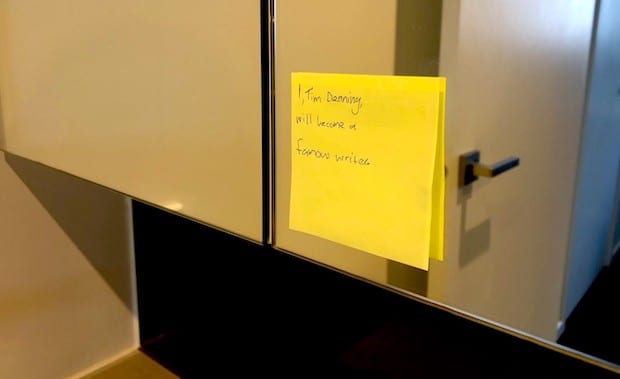Success Advice
The Creator Of ‘Dilbert’ Will Teach You A Lot — Here’s What He Taught Me.

Growing up, my dad bought me many books each month as a treat. One of those was a small book of office cartoons called ‘Dilbert.’
I don’t have the book any longer, but it stuck in my head. It’s simplicity and beautiful design was a work of art.
Years later, through listening to a podcast, I got to know who the author was — a man named Scott Adams. He’s no ordinary guy and his recipe for success and for life have some really valuable insights. He doesn’t pretend to know it all, but he thrives on planting new ideas in peoples heads and questioning everything we’ve ever believed.
I truly believe the lessons Scott teaches will help you in a major way.
To save you a lot of time, here are the 23 most important lessons that Scott Adams can teach you:
1. Chase systems, not goals
Systems attract luck in your life. This is Scott Adams main point in all his books, speeches and podcast interviews.
The difference between a goal and a system is very similar. The main thing to understand that’s different is that goal-focused people are obsessed with the outcome, whereas people that are obsessed with systems are focused on applying their system despite the result — applying the system is the reward, not the result.
Luck doesn’t happen by magic. It’s the system that makes you lucky. The system doesn’t guarantee you luck, but it puts you in closer proximity to it.
You could say that systems are another word for habits. Continuously practicing your habits produces the right results, not aiming for results. Eat right don’t aim to lose weight. Invest your savings each month don’t be obsessed with being rich. Don’t aim to be a millionaire in business just focus on being a good entrepreneur.
If you learn nothing else from Scott Adams, then remember this piece of advice.
2. Combine multiple skills to get something world class.
Scott Adams was an average writer, an okay cartoonist, a typical office worker and he was average at being funny. He combined those skills to become a world-famous cartoonist.
Any of those skills on their own were not enough. By combining these skills, he found his own lane.
Combine mediocre skills to become world class.
3. Affirmations are not stupid
First, it was Jim Carey that preached the power of affirmations in the 90’s when he became a successful actor and bragged that it was affirmations and visualization of his success that got him there.
Around the same time, Scott Adams was promoting affirmations also and how they helped him become a famous cartoonist.
Affirmations do the following:
- Help you focus.
- Boost your optimism and energy.
- Validate your talent that your subconscious mind already knew you had.
Affirmations are another system that Scott uses to remind himself what he’s trying to achieve, and then he imagines the outcome and what it feels like.Since reading Scott’s books, I’ve created my own affirmation. I have pinned it to the top of my email inbox, so I never forget it.
My affirmation goes like this:
I, Tim Denning, will become a famous writer that the world remembers long after I’m gone.
Affirmations, Scott says, are about improving your focus and not summoning magic. Your brain can be easily distracted.
“Your subconscious mind has the ability to see opportunities long before your conscious mind has, and affirmations are how you kickstart that process and enable this powerful tool”
Create your own affirmation so you too can focus on doing one thing and living your lifelong dream. They really do work.
4. Every human is a mess on the inside.
We all have the same struggles.
We’re all going to die one day.
“If you could only hear other people’s thoughts for a day you’d realize that we’re all crazy”
The understanding that being human is difficult and we’re all a mess is how you stop thinking you’re special and start taking chances.
We all have it tough and so if certain individuals can rise above the odds and achieve the impossible, then so can you. Our potential is the same.
We just have to override that noisy mind of ours and get it to perform in a way that is advantageous to our goals. That’s where the subtle art of mastery lies.
5. Beyond wealth is only one thing.
This is an idea you’ll hear many times over. If you look at any successful person, you’ll see that once they create enough money to have their own needs met, without any prompts, their focus turns outward.
Beyond lots of wealth is only two things:
- Improving the world in some way
- Helping others
I too have found this to be the case. Once I’d achieved what others perceived to be success, I instantly became obsessed with helping others do the same through blogging. Our human brains are wired this way.
Scott goes a step further and says that you need to focus on your own selfish objectives first before you can create the resources to serve unselfish objectives like helping others.
My personal belief is that you don’t need to wait until you create abundance to start serving others. As Tony Robbins says “If you won’t give a dime out of a dollar, then you’re not going to give a million out of ten million dollars.”
Either way, there is a point where you need to be selfish with your life goals so that you can create the time and space to do that thing you love. Just don’t forget to help other people.
6. You’ll be appreciated for being in a good mood.
When you work on your own selfish goals, you feel good.
Every Saturday I write lots of articles and don’t hang out with my friends. At night time, my friends and I, normally meet up after my big writing day and I feel awesome — that’s because I did the thing that makes me happy.
The result is that I rock up to dinner with my friends in a good mood. They appreciate this. There have been Saturdays where I’ve hardly got to write and on those evenings I roll up pissed off, and uninspired.
Scott reflects on this concept in his book “How To Fail At Almost Everything And Still Win Big.” He finds the same thing I do which is that your personal energy is affected by your selfish goals.
“It’s better to be in a good mood than to avoid your selfish goals and be perpetually pissed off”
7. Simple communication is the most effective.
If there’s a choice of using simple words or complex words, choose simple.
If the email could be 100 words or 1000 words, choose 100.
If your speech could have 6 call to actions or one, choose one.
One day I received an email from a long time reader of my blogs. English was their second language. They emailed to say that the number one reason they loved my writing was that it was easy to understand for people who were not born speaking English.
That’s when it hit me how important it is to communicate in a simple way. It’s simple communication that has allowed me to reach so many people around the world through my blogging.
If you have a choice, say less.
If you have a choice, choose simple words.
Simple communication is easy to follow. It’s how you can influence almost anyone to take action, and learn from your life experience and personal stories.
8. Don’t multi-task on days where you have important tasks.
Have a singular focus on a day when you have a job interview.
If tonight you’re giving a speech to a thousand people, don’t batch one hundred, small, insignificant tasks right before it.
People get pissed off with me all the time because if I have a big event happening on a particular day, I ignore everything.
My phone is on aeroplane mode, I don’t answer emails, I arrive at meetings early, I leave work early and I eat the healthiest possible food I can.
That’s how you get a clear head and prepare for important tasks that can change your life.
9. Motivation to tidy up.
If you want to be motivated to clean up, then invite people over regularly. This will force you to clean up mess.
Untidiness makes you look at the mess and want to clean it up. This distraction stops you from focusing on the task that you want to complete — for me, that’s writing a blog post.
Scott says that we should notice how we feel before and after cleaning up.
He believes that the majority of us will feel good after tidying up and have that we’ll have more energy. That energy can then be channeled towards important tasks and the people you care about.
10. Avoid downer content.
Sad movies, scary books, the news, shows that feature people who do nothing but complain — avoid them all as much as possible.
“Good moods come from not letting outside influences mess up your attitude”
That’s why I’m often talking about uplifting movies, podcasts that aim to inspire, and books that show you how to achieve the seemingly impossible.
It’s a small hack but it works.
11. The LEADERSHIP STATUS changes us for the better — take the risk.
I learned this recently when I took a leadership position looking after a big team that was well and truly beyond my current skill set.
I grew into the challenge quickly by acting confident and leaning into my new job title.
Taking an opportunity that’s a risk is a great way to unlock talent that you haven’t previously exercised before.
Scott often tells a story in his books about how one of his coworkers transforms from an unimpressive personality to confidence and power within two months of being promoted for a job he didn’t deserve.
He says:
“We fake it until it becomes real.”
This is useful advice and it’s why you should take a risk with your career even if you are inexperienced, under-qualified or lack key skills. If it can work for me, it can work for you.
12. There’s magic in what you did before 10 years of age.
This very thought knocked me flat on my face. I’d never thought much in recent years about what I did before the age of ten.
When I did think about it recently, I remembered that I used to write a lot, tell stories and imagine really big, crazy dreams.
Fast-forward to right now and that’s exactly what I’m doing without realizing it was what I did when I was ten. Until Scott Adams shared this thought with me through his books, I’d never made the correlation for myself. Holy crap!!!
What did you do before the age of ten?
13. You need at least one person excited at the start.
Even if you have no followers yet, how the first stranger reacts to your work is a good indicator of whether you’ll go on to be successful in a particular field.
The first person that ever commented on my blog posts outside of my family and friends was a gentleman named Torio. He was in love with my blog posts and wrote to me every week telling me to keep going. He was the first to believe in my blogging ability.
It’s not how they feel either that matters; it’s the action they take. Do they share your work, send you an email, leave a comment or buy your product?
Focus on the early actions strangers take after seeing your work not on what your family and friends say. Actions speak the loudest.
14. Talent and risk are interlinked.
Most talents require trying lots of things. The motivation to try lots of things requires an element of risk.
With trying comes failing and you won’t fail lots of times unless you’re prepared to take risks — they’re interlinked.
Go through the list of people that have achieved success and inspire you. I’m willing to bet they all took risks in the early days.
Taking risks is uncomfortable but so is never discovering your own talents and maximizing your potential. The choice is yours.
15. Praise people when you see them fail.
“Adults are starved for a kind word” — Scott Adams”
One of the moments that transformed Scott’s life was when he saw a speaking instructor praise a woman who volunteered to speak in front of the group and failed after a few words.
The instructor said she was brave instead of criticizing her. He switched the focus from her poor speaking performance to her bravery. The next week the same woman spoke again and got a little better. The pattern continued.
Praise people for what they do right and you’ll see them improve in a big way.Praising is an important trait in leadership.
16. People do not make decisions based on reason.
How we feel affects our decision-making ability far more than reason.
Make people feel something and they’re much more likely to listen to you or be influenced by you.
17. Experts are right 98% of the time on easy stuff and only 50% on the complicated or new stuff.
Knowing which situations an expert is likely to be wrong, is helpful.
It helps you to question opinions and seek out more than one answer. Experts are great at answering simple problems, but as soon as the problem becomes complex, the chance an expert will be able to provide the correct answer is limited severely.
Scott backs up this idea with his experience in losing his voice and needing throat surgery. His health issue was complex and so the average expert could only provide simple solutions that he’d already tried and had no success with.
His voice eventually made a near full recovery because he kept looking for answers instead of settling on one expert’s opinion.
Experts can be overrated. Don’t stop looking for the answer to complex problems.
18. The formula for happiness (according to Scott).
- Have control of your schedule
- Progress produces the chemicals in your body that make you happy
- Exercise, eat right and nap
- Your happiness depends on being good to others
Happiness is one way I’ve found momentum in my own life. Using the above four strategies I’ve been able to extract the necessary energy from life to do that which I was not qualified for, was scared out of my mind to commit to, and didn’t yet have the skills needed.
“Happiness is closer to today’s version of yourself than you think”
19. Failure to imagine makes you pessimistic.
“Artificial Intelligence will take our jobs”
“The internet has commoditized our work”
“Politics is screwed”
These are all the thoughts of a pessimist. Focusing on these ideas whether they may be true or not will block every bit of imagination you have.
You need your imagination to be creative and to create the parts of your life that don’t yet exist.
20. Ask yourself ‘What did I eat?’ if you’re in a bad mood.
Health Expert Tyler Tolman says that people that are always in a bad mood just need to take a dump because they’re constipated.
Scott says something similar about what we eat. Eating junk food sucks away our energy which translates to us being in a crappy mood.
“You can literally eat and poo your way to being more optimistic”
21. Simplification will stop you putting things off.
“Complication forces you to borrow time, resources and willpower from something else you care about” — Scott Adams
As soon as a task feels like work, you’re then reliant on your willpower which you have very limited amounts of. This will force you to miss deadlines, screw up your goals and get pissed off for no reason.
Simplification is about making things easier so you can take tasks from the scheduling column and move them to the habit column. Habits don’t work until they’re simple enough. Simple allows you to enable auto-pilot mode.
22. Hiring managers will be biased towards healthy candidates.
This one sucks, but it’s true based on my experience.
Healthy people are more fun to be around and are perceived to be more optimistic because of their energy levels.
23. Optimists see opportunities that pessimists miss.
Living in fear and seeing the problem with everything that comes your way makes you pessimistic.
Pessimism is a filter that allows you to see the problem but blocks you from simultaneously seeing the solution. A lot of the opportunities I’ve discovered in my life, through the lens of the internet, look like a waste of time.
Taking blogging as an example: The internet says that making money from blogging is nearly impossible. There’s too many websites, reduced spending on website banners, more difficulty with affiliate links and hundreds of hours required to get your content noticed on social media.
If I were to be guided by pessimism, then I’d quit blogging right now.
I choose to stick my middle finger up at the odds and focus on doing something I love, and being optimistic about what I can achieve. That’s the thinking that led me to today.
If nothing else, this post is an expression of my optimism that anyone can achieve extraordinary results and be happy. The solutions are easier than you think, thanks partly, to the wisdom of Scott Adams.
That’s what the creator of Dilbert can teach us all.
If you want to increase your productivity and learn some more valuable life hacks, then join my private mailing list on timdenning.net
Business
If Your Business Internet Keeps Letting You Down, Read This
From smoother operations to better security, dedicated internet access is quietly powering today’s high-performing businesses.

Today, a dependable internet service is the bedrock for uninterrupted business operations. Many organizations rely on stable online connections for communication, data transfer, and customer interaction. (more…)
Did You Know
How Skilled Migrants Are Building Successful Careers After Moving Countries
Behind every successful skilled migrant career is a mix of resilience, strategy, and navigating systems built for locals.

Moving to a new country for work is exciting, but it can also be unnerving. Skilled migrants leave behind familiar systems, networks, and support to pursue better job opportunities and a better future for their families. (more…)
Life
10 Research-Backed Steps to Create Real Change This New Year
This New Year could finally be the one where you break old patterns and create real, lasting change.

Every New Year, we make plans and set goals, but often repeat old patterns. (more…)
Change Your Mindset
The Silent Skill That Makes People Respect You Instantly
What truly earns respect and why most people go about it the wrong way

Everybody craves respect but not everyone earns it. Some people believe that a title, years of experience, or a position of authority automatically entitles them to respect. (more…)
-

 Did You Know4 weeks ago
Did You Know4 weeks agoHow Skilled Migrants Are Building Successful Careers After Moving Countries
-

 Health & Fitness5 days ago
Health & Fitness5 days agoWhat Minimalism Actually Means for Your Wellness Choices
-

 Did You Know4 days ago
Did You Know4 days agoWhy Most Online Courses Fail and How to Fix Them
-

 Business5 days ago
Business5 days agoIf Your Business Internet Keeps Letting You Down, Read This
-

 News19 hours ago
News19 hours agoBrandon Willington Builds 7-Figure Business by Ignoring Almost Everything



















1 Comment